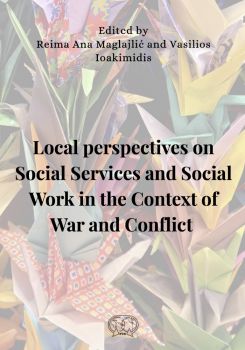Sussex social work academic edits international volume on social work responses to war and conflict
By: Heather Stanley
Last updated: Wednesday, 5 November 2025

Reima hopes that this volume will serve as an invitation to connect, make sense of our experiences, support each other, and develop locally rooted knowledge of social support for sustainable justice and peace.
A new volume published by the International Federation of Social Workers (IFSW) and co-edited by Dr Reima Ana Maglajlic, Associate Professor in Social Work at the University of Sussex and Head of the Department of Social Work & Social Care, is an important and significant development of works from a network co-facilitated by Dr Maglajlic of social work practitioners and academics who have experienced - or are experiencing - political conflicts in their countries of origin. The edition also includes contributions from those using health and social care services in conflict-affected countries.
‘Local Perspectives on Social Services and Social Work in the Context of War and Conflict’ was initiated by Dr Maglajlic and co-edited collaboratively with Professor Vasilios Ioakimidis from the University of West Attica in Greece. It is available as a free download and evidences the commitment to local and experiential knowledge in conflict-affected contexts through contributions by social work practitioners, academics, and people who use health and social care services.
Dr Pascal Rudin, Interim Secretary-General of the International Federation of Social Workers (IFSW), commented:
“This publication brings to light the lived experiences of social workers and communities affected by war and political conflict, demonstrating how the profession responds not only with compassion but also with courage and advocacy for peace. It embodies the Federation’s core values of solidarity, justice, and human dignity, strengthening IFSW’s global voice in promoting social work as an active force for reconciliation, human rights, and community resilience.
“By amplifying local perspectives and connecting practitioners across continents, it contributes to IFSW’s mission of co-building a peaceful and inclusive world grounded in social justice and shared humanity.”
Initiated in the early 2000s by Professor Jim Campbell, Emeritus Professor of Social Work at University College Dublin, the ‘International Network on Social Work and Political Conflict’ met and shared experiences from across Europe, primarily in Bosnia and Herzegovina, Cyprus, and Northern Ireland. It subsequently evolved to create a space for mutual learning and to broaden its reach to other conflict-affected contexts. Part of that evolution was the creation and delivery of a free six-week continuing professional development (CPD) short course initiated by Dr Maglajlic and Professor Ioakimidis and hosted by the International Federation of Social Workers (IFSW).
The popularity of the CPD programme led to further expansion of the network which enabled Dr Valerie Ouedraogo from MacEwan University in Edmonton, Canada, to become a Visiting Research Fellow at the University of Sussex in 2023/24, funded by the British Academy Visiting Fellowship programme. Supported by Dr Maglajlic, Dr Ouedraogo’s work during this period focused on the impact of the ongoing political conflict on the organisation and delivery of social services for the internally displaced people in her home country of Burkina Faso.
Since October 2024, Dr Maglajlic - together with Dr Ouedraogo and Carolyn Ewart, former National Director of the British Association of Social Workers for Northern Ireland – initiated and facilitates regular meetings for the now expanding International Network on Social Work and Political Conflict (INSWPC) which has more recently welcomed members from the Democratic Republic of Congo, Ethiopia, Hong Kong and Sudan.
Dr Maglajlic commented:
“My journey into social work coincided with the start of political conflict in the country of my birth, Croatia. It continued to be shaped by my experiences working in my father’s home country, Bosnia and Herzegovina, between 1999-2007. Woven together, social work and war have shaped my personal life as well as my professional learning, practice, and research over the past 35 years.
“It has been an honour and a privilege to facilitate this work and to support and hold space for other colleagues who have similar experiences. I hope this free resource is of use for other social work practitioners, academics, students, as well as representatives of the initiatives run by people who use health and social care services from conflict-affected contexts.
“I also hope that it serves as an invitation to connect as we collaborate to make sense of our experiences, learn from each other, support each other, and develop locally rooted knowledge of social support for sustainable justice and peace.”

